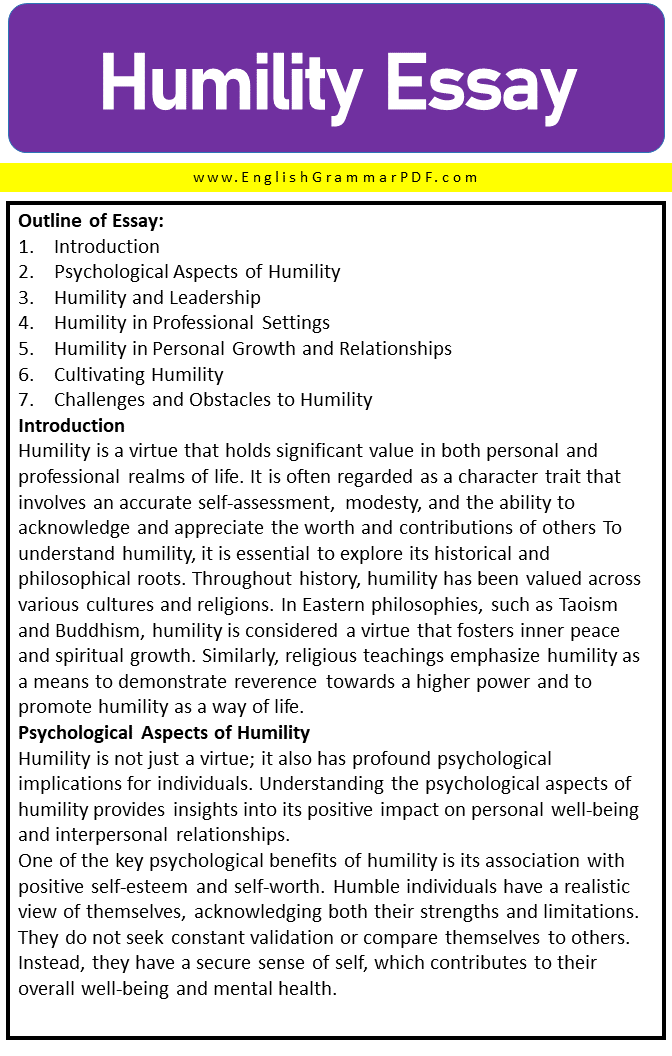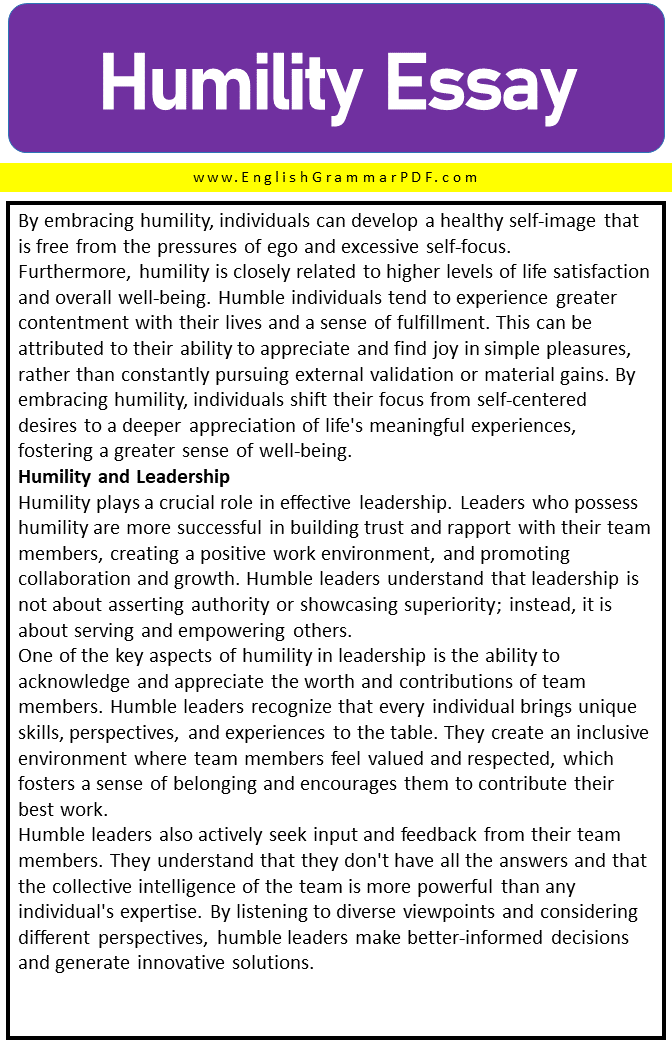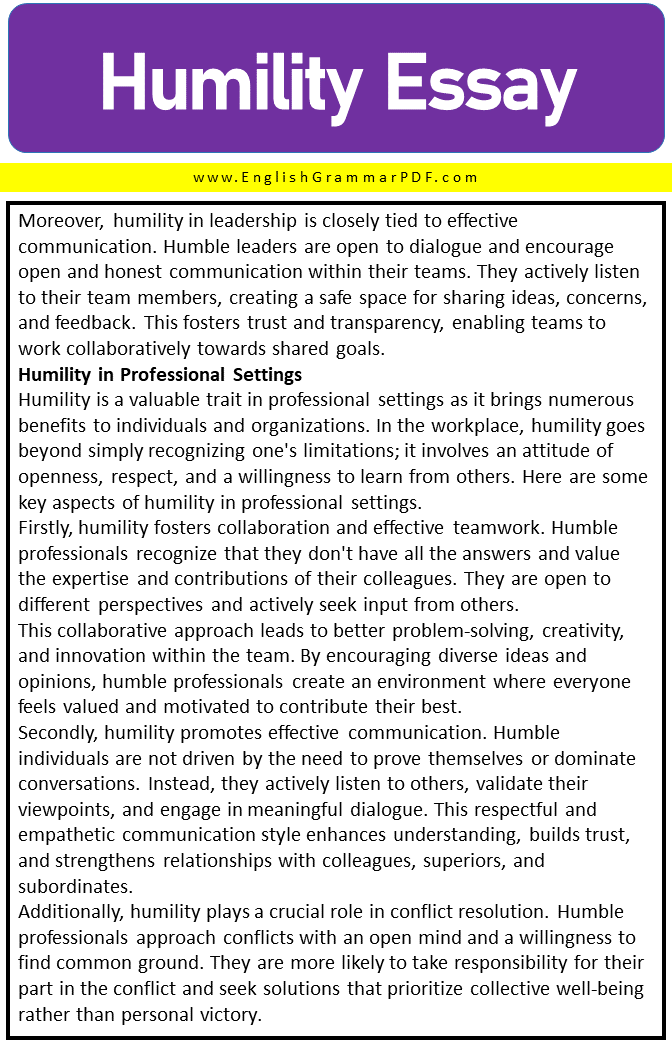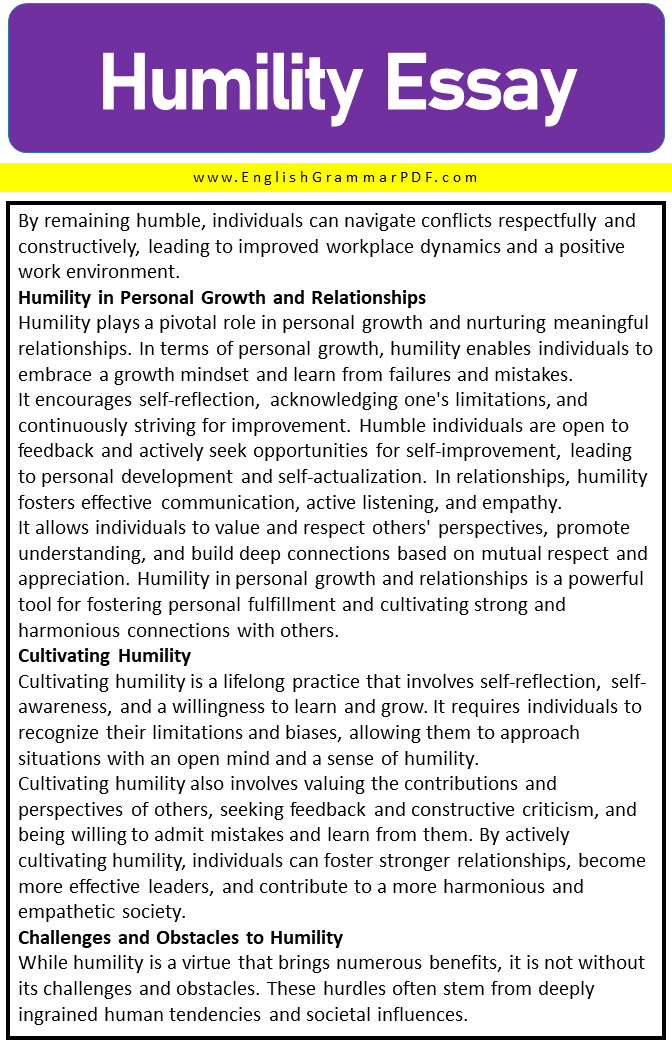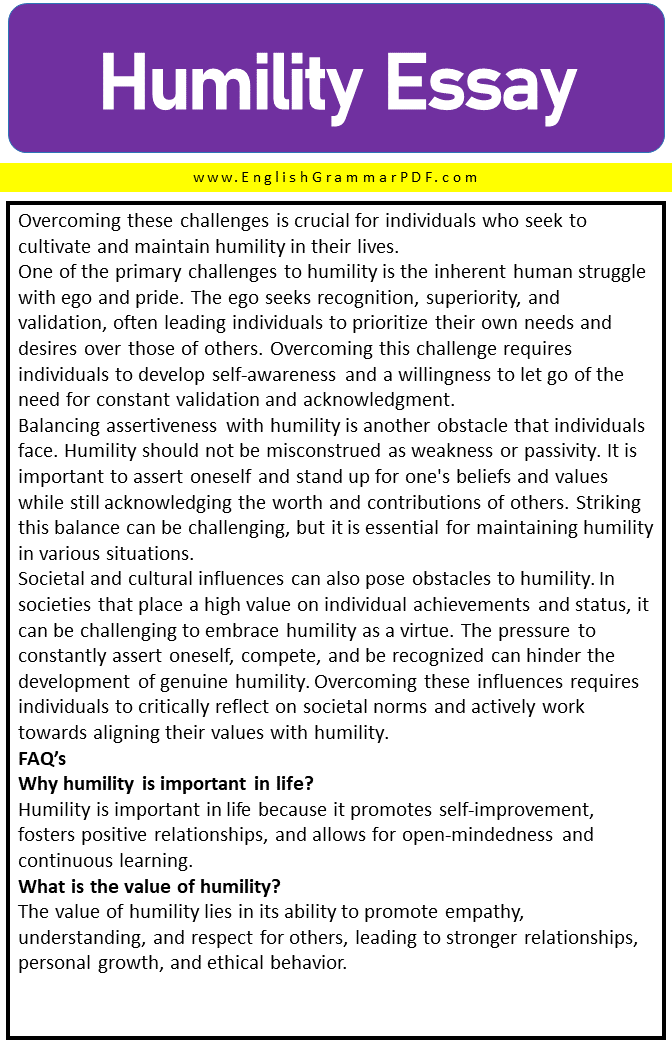Humility Essay
Outline of Essay:
- Introduction
- Psychological Aspects of Humility
- Humility and Leadership
- Humility in Professional Settings
- Humility in Personal Growth and Relationships
- Cultivating Humility
- Challenges and Obstacles to Humility
Introduction
Humility is a virtue that holds significant value in both personal and professional realms of life. It is often regarded as a character trait that involves an accurate self-assessment, modesty, and the ability to acknowledge and appreciate the worth and contributions of others To understand humility, it is essential to explore its historical and philosophical roots. Throughout history, humility has been valued across various cultures and religions. In Eastern philosophies, such as Taoism and Buddhism, humility is considered a virtue that fosters inner peace and spiritual growth. Similarly, religious teachings emphasize humility as a means to demonstrate reverence towards a higher power and to promote humility as a way of life.
Psychological Aspects of Humility
Humility is not just a virtue; it also has profound psychological implications for individuals. Understanding the psychological aspects of humility provides insights into its positive impact on personal well-being and interpersonal relationships.
One of the key psychological benefits of humility is its association with positive self-esteem and self-worth. Humble individuals have a realistic view of themselves, acknowledging both their strengths and limitations.
They do not seek constant validation or compare themselves to others. Instead, they have a secure sense of self, which contributes to their overall well-being and mental health. By embracing humility, individuals can develop a healthy self-image that is free from the pressures of ego and excessive self-focus.
Furthermore, humility is closely related to higher levels of life satisfaction and overall well-being. Humble individuals tend to experience greater contentment with their lives and a sense of fulfillment. This can be attributed to their ability to appreciate and find joy in simple pleasures, rather than constantly pursuing external validation or material gains. By embracing humility, individuals shift their focus from self-centered desires to a deeper appreciation of life’s meaningful experiences, fostering a greater sense of well-being.
Humility and Leadership
Humility plays a crucial role in effective leadership. Leaders who possess humility are more successful in building trust and rapport with their team members, creating a positive work environment, and promoting collaboration and growth. Humble leaders understand that leadership is not about asserting authority or showcasing superiority; instead, it is about serving and empowering others.
One of the key aspects of humility in leadership is the ability to acknowledge and appreciate the worth and contributions of team members. Humble leaders recognize that every individual brings unique skills, perspectives, and experiences to the table. They create an inclusive environment where team members feel valued and respected, which fosters a sense of belonging and encourages them to contribute their best work.
Humble leaders also actively seek input and feedback from their team members. They understand that they don’t have all the answers and that the collective intelligence of the team is more powerful than any individual’s expertise. By listening to diverse viewpoints and considering different perspectives, humble leaders make better-informed decisions and generate innovative solutions.
Moreover, humility in leadership is closely tied to effective communication. Humble leaders are open to dialogue and encourage open and honest communication within their teams. They actively listen to their team members, creating a safe space for sharing ideas, concerns, and feedback. This fosters trust and transparency, enabling teams to work collaboratively towards shared goals.
Humility in Professional Settings
Humility is a valuable trait in professional settings as it brings numerous benefits to individuals and organizations. In the workplace, humility goes beyond simply recognizing one’s limitations; it involves an attitude of openness, respect, and a willingness to learn from others. Here are some key aspects of humility in professional settings.
Firstly, humility fosters collaboration and effective teamwork. Humble professionals recognize that they don’t have all the answers and value the expertise and contributions of their colleagues. They are open to different perspectives and actively seek input from others.
This collaborative approach leads to better problem-solving, creativity, and innovation within the team. By encouraging diverse ideas and opinions, humble professionals create an environment where everyone feels valued and motivated to contribute their best.
Secondly, humility promotes effective communication. Humble individuals are not driven by the need to prove themselves or dominate conversations. Instead, they actively listen to others, validate their viewpoints, and engage in meaningful dialogue. This respectful and empathetic communication style enhances understanding, builds trust, and strengthens relationships with colleagues, superiors, and subordinates.
Additionally, humility plays a crucial role in conflict resolution. Humble professionals approach conflicts with an open mind and a willingness to find common ground. They are more likely to take responsibility for their part in the conflict and seek solutions that prioritize collective well-being rather than personal victory. By remaining humble, individuals can navigate conflicts respectfully and constructively, leading to improved workplace dynamics and a positive work environment.
Humility in Personal Growth and Relationships
Humility plays a pivotal role in personal growth and nurturing meaningful relationships. In terms of personal growth, humility enables individuals to embrace a growth mindset and learn from failures and mistakes.
It encourages self-reflection, acknowledging one’s limitations, and continuously striving for improvement. Humble individuals are open to feedback and actively seek opportunities for self-improvement, leading to personal development and self-actualization. In relationships, humility fosters effective communication, active listening, and empathy.
It allows individuals to value and respect others’ perspectives, promote understanding, and build deep connections based on mutual respect and appreciation. Humility in personal growth and relationships is a powerful tool for fostering personal fulfillment and cultivating strong and harmonious connections with others.
Cultivating Humility
Cultivating humility is a lifelong practice that involves self-reflection, self-awareness, and a willingness to learn and grow. It requires individuals to recognize their limitations and biases, allowing them to approach situations with an open mind and a sense of humility.
Cultivating humility also involves valuing the contributions and perspectives of others, seeking feedback and constructive criticism, and being willing to admit mistakes and learn from them. By actively cultivating humility, individuals can foster stronger relationships, become more effective leaders, and contribute to a more harmonious and empathetic society.
Challenges and Obstacles to Humility
While humility is a virtue that brings numerous benefits, it is not without its challenges and obstacles. These hurdles often stem from deeply ingrained human tendencies and societal influences. Overcoming these challenges is crucial for individuals who seek to cultivate and maintain humility in their lives.
One of the primary challenges to humility is the inherent human struggle with ego and pride. The ego seeks recognition, superiority, and validation, often leading individuals to prioritize their own needs and desires over those of others. Overcoming this challenge requires individuals to develop self-awareness and a willingness to let go of the need for constant validation and acknowledgment.
Balancing assertiveness with humility is another obstacle that individuals face. Humility should not be misconstrued as weakness or passivity. It is important to assert oneself and stand up for one’s beliefs and values while still acknowledging the worth and contributions of others. Striking this balance can be challenging, but it is essential for maintaining humility in various situations.
Societal and cultural influences can also pose obstacles to humility. In societies that place a high value on individual achievements and status, it can be challenging to embrace humility as a virtue. The pressure to constantly assert oneself, compete, and be recognized can hinder the development of genuine humility. Overcoming these influences requires individuals to critically reflect on societal norms and actively work towards aligning their values with humility.
FAQ’s
Why humility is important in life?
Humility is important in life because it promotes self-improvement, fosters positive relationships, and allows for open-mindedness and continuous learning.
What is the value of humility?
The value of humility lies in its ability to promote empathy, understanding, and respect for others, leading to stronger relationships, personal growth, and ethical behavior.
How do you use humility in life?
Humility can be practiced by actively listening to others, acknowledging one’s mistakes, valuing diverse perspectives, showing gratitude, and treating others with kindness and respect.
Download the PDF of the Essay:
Explore More Essays:

